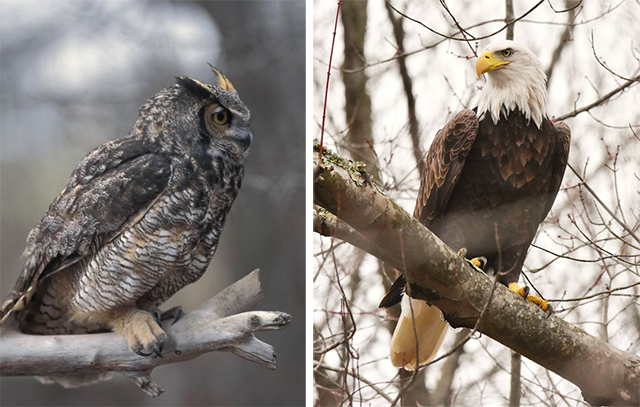
Around January/February is the time of year Dublin’s resident raptors—eagles, owls and hawks—are courting and getting ready to lay eggs and start their new families.
The bald eagles who hang out in Dublin, fishing up and down the Scioto River, may not be seen as frequently as the females begin to lay eggs and brood the nest. Great-horned owls will be fairly vocal this time of year, defending their nest areas and also beginning to lay eggs. Red-tailed and red-shouldered hawks begin nesting shortly after that.
These pairs, if they stay healthy, will nest about 10-15 seasons in their lifetime. Eagle pairs may nest 20 or more times. Female raptors are super-moms, doing most of the incubating of eggs and protecting the nest while their mate is away hunting.
The world record for nesting seasons belongs to the world’s oldest known wild bird: the female Laysan Albatross named Wisdom.
While albatross are not found in Ohio, Wisdom was banded in 1956 and studied by American biologist Chandler Robbins of Pataxunt Research Refuge. She was an adult bird then, so at least two years old. She was identified by her band again in 2002 during a bird count. Chandler came out of retirement just to keep track of her. Sadly, he passed away March 20, 2017, and will not get to see the egg Wisdom has laid this year. She nests each year at the Midway Atoll National Wildlife Refuge, though albatross only lay one egg and rear young typically every other year. She has reared chicks two consecutive years before, and has reared about 35 chicks with her mate in her lifetime so far.
Albatross spend most of their time out on open seas, soaring and gliding over the Pacific Ocean. They rarely flap their wings. They feed while floating on the water and grasping squid, fish and other sea animals with their slender, sharp, hook-tipped bill.
One of the greatest dangers for these beautiful seabirds as well as our local wildlife are the plastics and other litter they may mistake for food or become entangled in. We can help wildlife all around the world, including these threatened seabirds, right here in Dublin: by reducing use of and properly recycling of plastics as well as making sure all of our solid waste is properly disposed of so it does not get blown away in the wind or washed into storm sewers, where it can enter the rivers and end up in our oceans.
